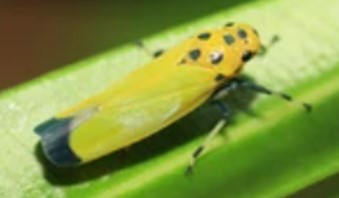
Nephotettix bipunctatus is a Homoptera species. Host in rice, water jasmine, wheat, barley, barnyard grass and so on. Both adults and nymphs can damage rice. The nymphs mainly gather at the base of the rice stem, sucking the nutrient solution with needle-like mouthparts, destroying the conducting tissue, showing many brown spots, affecting the normal growth of the rice plant, and the base of the rice stem becomes black in severe cases, the late rotten stalk lodging. Stem wounds caused by nephotettix bipunctatus can also contribute to the occurrence of sclerotinia. During the heading and grain-filling stages of rice, adults and nymphs also feed on the ears and leaves.
When feeding and laying eggs, the nephotettix bipunctatus stabs the stems and leaves of the host, destroys the conducting tissue, and shows brown stripes on the injured part, causing the plant to turn yellow or die. At present, the most widely used control methods are agricultural control, physical control and chemical control. The selection of high-yielding insect-resistant varieties is the most effective measure to control this pests. Lifeasible provides gene editing services for nephotettix bipunctatus with zinc-finger nucleases (ZFNs), transcription activator-like effector nucleases (TALEN) and CRISPR/Cas9 to control them.
| Editable genes | Relevant traits exhibited after editing |
| OAZ ODC |
|
| NcPGRP |
|
| NcVgR |
|
Lifeasible offers ZFNs to edit some genes in nephotettix bipunctatus. We use ZFNs to obtain the results according to your needs. The editing rate is not less than 90%.
Lifeasible provides two methods to edit the specific gene in nephotettix bipunctatus through TALEN. One method is constructing the vector and then transgene to knockout gene. Another is injecting mRNA synthesized in vitro of nephotettix bipunctatus.
Lifeasible provides CRISPR/Cas9 to edit the gene in nephotettix bipunctatus with high efficiency and mutate multiple genes simultaneously.
Lifeasible provides gene editing services for nephotettix bipunctatus by three means include ZFNs, TALEN and CRISPR/Cas9 to affect the immune system and the reproduction of this organism to control them. If you are interested in our services or if you have any questions, please click online inquiry for more detailed information.